Functionalist and Conflict Theories: Analysis of Social Institutions
VerifiedAdded on 2023/04/17
|10
|2603
|155
Essay
AI Summary
This essay delves into the contrasting sociological perspectives of functionalism and conflict theory, examining their approaches to understanding social institutions. Functionalism, rooted in the work of Emile Durkheim, views society as an organism with interdependent parts working towards stability, while conflict theory, inspired by Karl Marx, focuses on inequalities and power struggles arising from uneven resource distribution. The essay analyzes how these theories interpret the role of institutions like family, highlighting their differing views on social harmony versus inherent conflict. It further explores control theory and anomie theory in relation to deviance, concluding with a comparative assessment of the strengths and limitations of both functionalism and conflict theory in providing a comprehensive understanding of society.
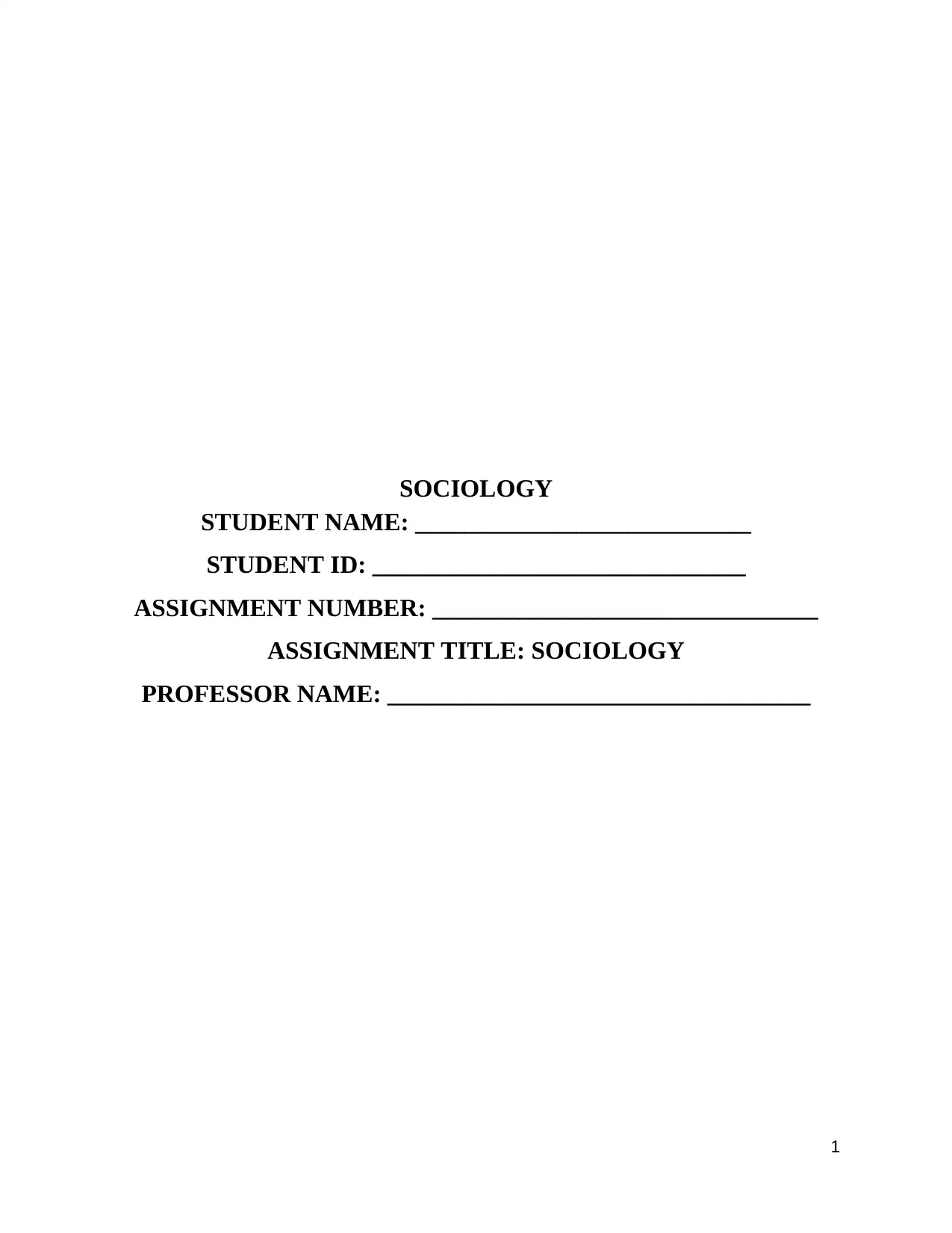
SOCIOLOGY
STUDENT NAME: ___________________________
STUDENT ID: ______________________________
ASSIGNMENT NUMBER: _______________________________
ASSIGNMENT TITLE: SOCIOLOGY
PROFESSOR NAME: __________________________________
1
STUDENT NAME: ___________________________
STUDENT ID: ______________________________
ASSIGNMENT NUMBER: _______________________________
ASSIGNMENT TITLE: SOCIOLOGY
PROFESSOR NAME: __________________________________
1
Paraphrase This Document
Need a fresh take? Get an instant paraphrase of this document with our AI Paraphraser
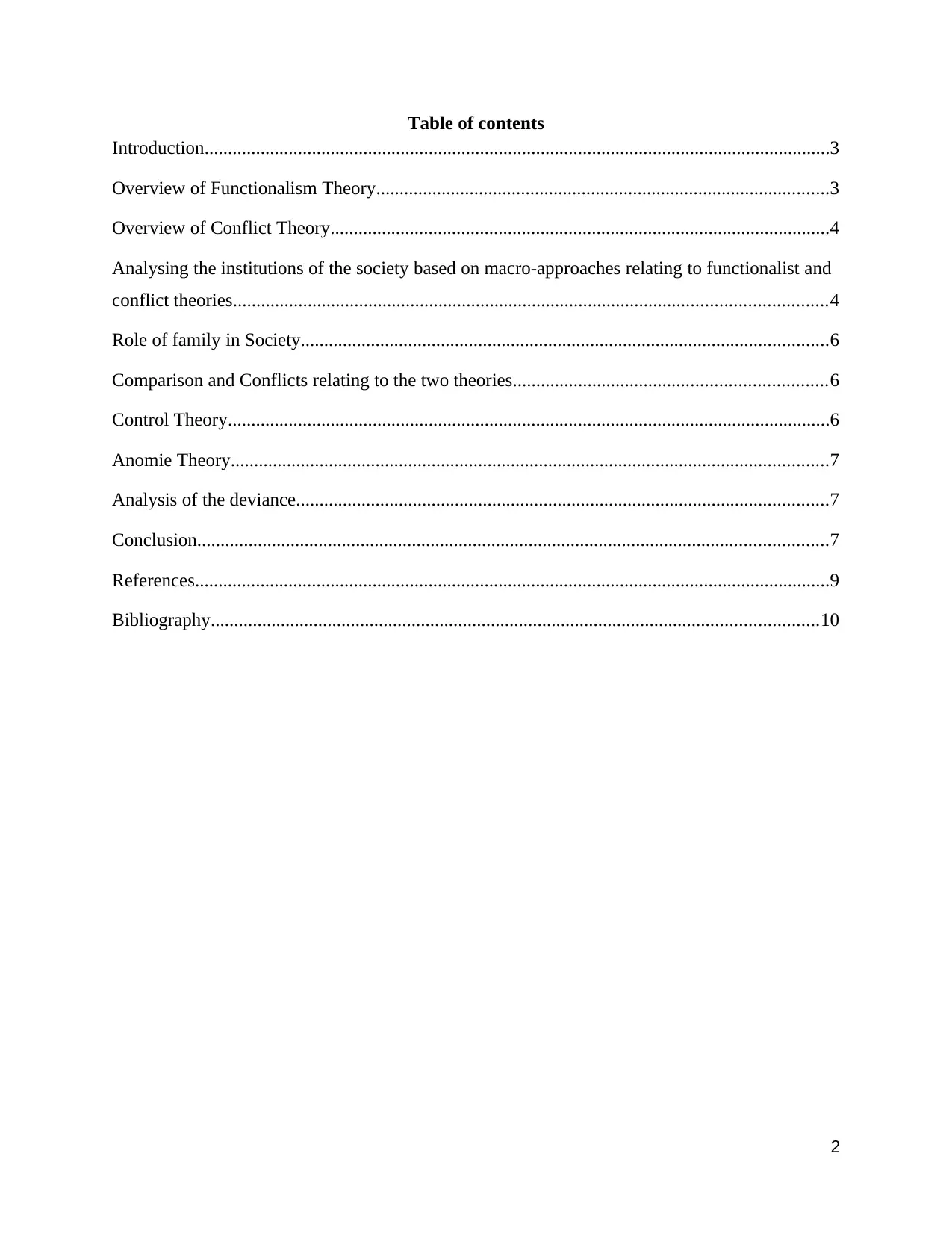
Table of contents
Introduction......................................................................................................................................3
Overview of Functionalism Theory.................................................................................................3
Overview of Conflict Theory...........................................................................................................4
Analysing the institutions of the society based on macro-approaches relating to functionalist and
conflict theories...............................................................................................................................4
Role of family in Society.................................................................................................................6
Comparison and Conflicts relating to the two theories...................................................................6
Control Theory.................................................................................................................................6
Anomie Theory................................................................................................................................7
Analysis of the deviance..................................................................................................................7
Conclusion.......................................................................................................................................7
References........................................................................................................................................9
Bibliography..................................................................................................................................10
2
Introduction......................................................................................................................................3
Overview of Functionalism Theory.................................................................................................3
Overview of Conflict Theory...........................................................................................................4
Analysing the institutions of the society based on macro-approaches relating to functionalist and
conflict theories...............................................................................................................................4
Role of family in Society.................................................................................................................6
Comparison and Conflicts relating to the two theories...................................................................6
Control Theory.................................................................................................................................6
Anomie Theory................................................................................................................................7
Analysis of the deviance..................................................................................................................7
Conclusion.......................................................................................................................................7
References........................................................................................................................................9
Bibliography..................................................................................................................................10
2
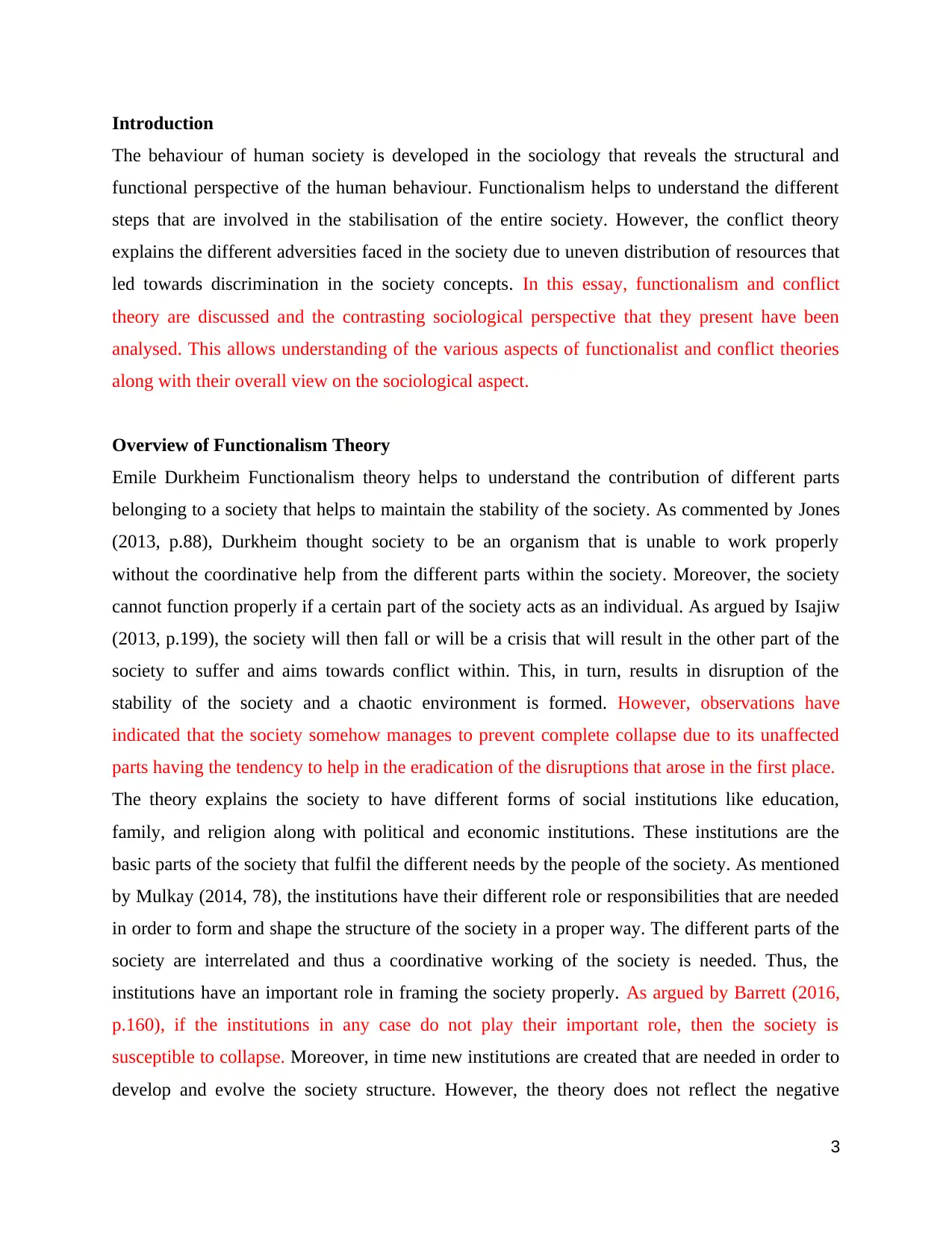
Introduction
The behaviour of human society is developed in the sociology that reveals the structural and
functional perspective of the human behaviour. Functionalism helps to understand the different
steps that are involved in the stabilisation of the entire society. However, the conflict theory
explains the different adversities faced in the society due to uneven distribution of resources that
led towards discrimination in the society concepts. In this essay, functionalism and conflict
theory are discussed and the contrasting sociological perspective that they present have been
analysed. This allows understanding of the various aspects of functionalist and conflict theories
along with their overall view on the sociological aspect.
Overview of Functionalism Theory
Emile Durkheim Functionalism theory helps to understand the contribution of different parts
belonging to a society that helps to maintain the stability of the society. As commented by Jones
(2013, p.88), Durkheim thought society to be an organism that is unable to work properly
without the coordinative help from the different parts within the society. Moreover, the society
cannot function properly if a certain part of the society acts as an individual. As argued by Isajiw
(2013, p.199), the society will then fall or will be a crisis that will result in the other part of the
society to suffer and aims towards conflict within. This, in turn, results in disruption of the
stability of the society and a chaotic environment is formed. However, observations have
indicated that the society somehow manages to prevent complete collapse due to its unaffected
parts having the tendency to help in the eradication of the disruptions that arose in the first place.
The theory explains the society to have different forms of social institutions like education,
family, and religion along with political and economic institutions. These institutions are the
basic parts of the society that fulfil the different needs by the people of the society. As mentioned
by Mulkay (2014, 78), the institutions have their different role or responsibilities that are needed
in order to form and shape the structure of the society in a proper way. The different parts of the
society are interrelated and thus a coordinative working of the society is needed. Thus, the
institutions have an important role in framing the society properly. As argued by Barrett (2016,
p.160), if the institutions in any case do not play their important role, then the society is
susceptible to collapse. Moreover, in time new institutions are created that are needed in order to
develop and evolve the society structure. However, the theory does not reflect the negative
3
The behaviour of human society is developed in the sociology that reveals the structural and
functional perspective of the human behaviour. Functionalism helps to understand the different
steps that are involved in the stabilisation of the entire society. However, the conflict theory
explains the different adversities faced in the society due to uneven distribution of resources that
led towards discrimination in the society concepts. In this essay, functionalism and conflict
theory are discussed and the contrasting sociological perspective that they present have been
analysed. This allows understanding of the various aspects of functionalist and conflict theories
along with their overall view on the sociological aspect.
Overview of Functionalism Theory
Emile Durkheim Functionalism theory helps to understand the contribution of different parts
belonging to a society that helps to maintain the stability of the society. As commented by Jones
(2013, p.88), Durkheim thought society to be an organism that is unable to work properly
without the coordinative help from the different parts within the society. Moreover, the society
cannot function properly if a certain part of the society acts as an individual. As argued by Isajiw
(2013, p.199), the society will then fall or will be a crisis that will result in the other part of the
society to suffer and aims towards conflict within. This, in turn, results in disruption of the
stability of the society and a chaotic environment is formed. However, observations have
indicated that the society somehow manages to prevent complete collapse due to its unaffected
parts having the tendency to help in the eradication of the disruptions that arose in the first place.
The theory explains the society to have different forms of social institutions like education,
family, and religion along with political and economic institutions. These institutions are the
basic parts of the society that fulfil the different needs by the people of the society. As mentioned
by Mulkay (2014, 78), the institutions have their different role or responsibilities that are needed
in order to form and shape the structure of the society in a proper way. The different parts of the
society are interrelated and thus a coordinative working of the society is needed. Thus, the
institutions have an important role in framing the society properly. As argued by Barrett (2016,
p.160), if the institutions in any case do not play their important role, then the society is
susceptible to collapse. Moreover, in time new institutions are created that are needed in order to
develop and evolve the society structure. However, the theory does not reflect the negative
3
⊘ This is a preview!⊘
Do you want full access?
Subscribe today to unlock all pages.

Trusted by 1+ million students worldwide
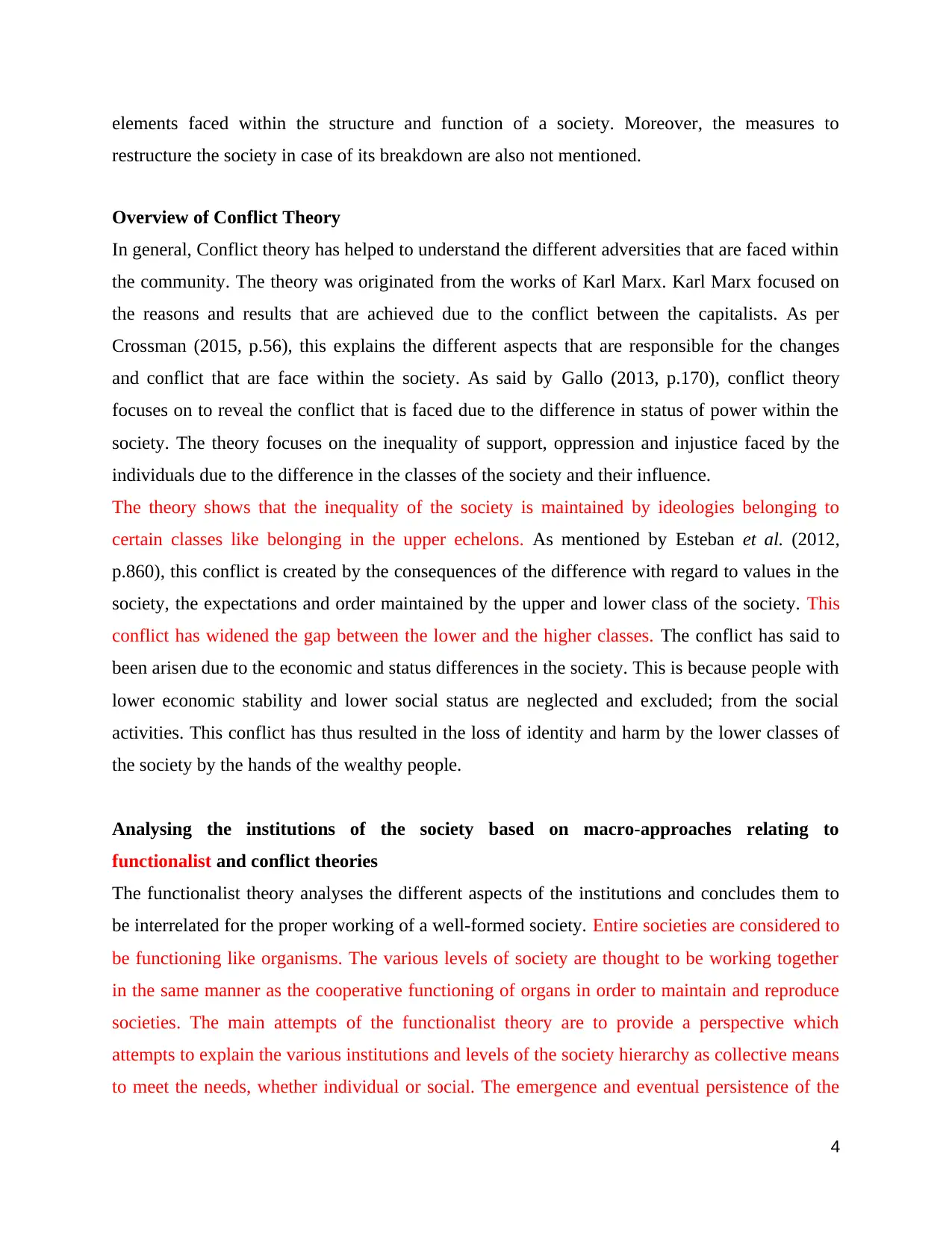
elements faced within the structure and function of a society. Moreover, the measures to
restructure the society in case of its breakdown are also not mentioned.
Overview of Conflict Theory
In general, Conflict theory has helped to understand the different adversities that are faced within
the community. The theory was originated from the works of Karl Marx. Karl Marx focused on
the reasons and results that are achieved due to the conflict between the capitalists. As per
Crossman (2015, p.56), this explains the different aspects that are responsible for the changes
and conflict that are face within the society. As said by Gallo (2013, p.170), conflict theory
focuses on to reveal the conflict that is faced due to the difference in status of power within the
society. The theory focuses on the inequality of support, oppression and injustice faced by the
individuals due to the difference in the classes of the society and their influence.
The theory shows that the inequality of the society is maintained by ideologies belonging to
certain classes like belonging in the upper echelons. As mentioned by Esteban et al. (2012,
p.860), this conflict is created by the consequences of the difference with regard to values in the
society, the expectations and order maintained by the upper and lower class of the society. This
conflict has widened the gap between the lower and the higher classes. The conflict has said to
been arisen due to the economic and status differences in the society. This is because people with
lower economic stability and lower social status are neglected and excluded; from the social
activities. This conflict has thus resulted in the loss of identity and harm by the lower classes of
the society by the hands of the wealthy people.
Analysing the institutions of the society based on macro-approaches relating to
functionalist and conflict theories
The functionalist theory analyses the different aspects of the institutions and concludes them to
be interrelated for the proper working of a well-formed society. Entire societies are considered to
be functioning like organisms. The various levels of society are thought to be working together
in the same manner as the cooperative functioning of organs in order to maintain and reproduce
societies. The main attempts of the functionalist theory are to provide a perspective which
attempts to explain the various institutions and levels of the society hierarchy as collective means
to meet the needs, whether individual or social. The emergence and eventual persistence of the
4
restructure the society in case of its breakdown are also not mentioned.
Overview of Conflict Theory
In general, Conflict theory has helped to understand the different adversities that are faced within
the community. The theory was originated from the works of Karl Marx. Karl Marx focused on
the reasons and results that are achieved due to the conflict between the capitalists. As per
Crossman (2015, p.56), this explains the different aspects that are responsible for the changes
and conflict that are face within the society. As said by Gallo (2013, p.170), conflict theory
focuses on to reveal the conflict that is faced due to the difference in status of power within the
society. The theory focuses on the inequality of support, oppression and injustice faced by the
individuals due to the difference in the classes of the society and their influence.
The theory shows that the inequality of the society is maintained by ideologies belonging to
certain classes like belonging in the upper echelons. As mentioned by Esteban et al. (2012,
p.860), this conflict is created by the consequences of the difference with regard to values in the
society, the expectations and order maintained by the upper and lower class of the society. This
conflict has widened the gap between the lower and the higher classes. The conflict has said to
been arisen due to the economic and status differences in the society. This is because people with
lower economic stability and lower social status are neglected and excluded; from the social
activities. This conflict has thus resulted in the loss of identity and harm by the lower classes of
the society by the hands of the wealthy people.
Analysing the institutions of the society based on macro-approaches relating to
functionalist and conflict theories
The functionalist theory analyses the different aspects of the institutions and concludes them to
be interrelated for the proper working of a well-formed society. Entire societies are considered to
be functioning like organisms. The various levels of society are thought to be working together
in the same manner as the cooperative functioning of organs in order to maintain and reproduce
societies. The main attempts of the functionalist theory are to provide a perspective which
attempts to explain the various institutions and levels of the society hierarchy as collective means
to meet the needs, whether individual or social. The emergence and eventual persistence of the
4
Paraphrase This Document
Need a fresh take? Get an instant paraphrase of this document with our AI Paraphraser
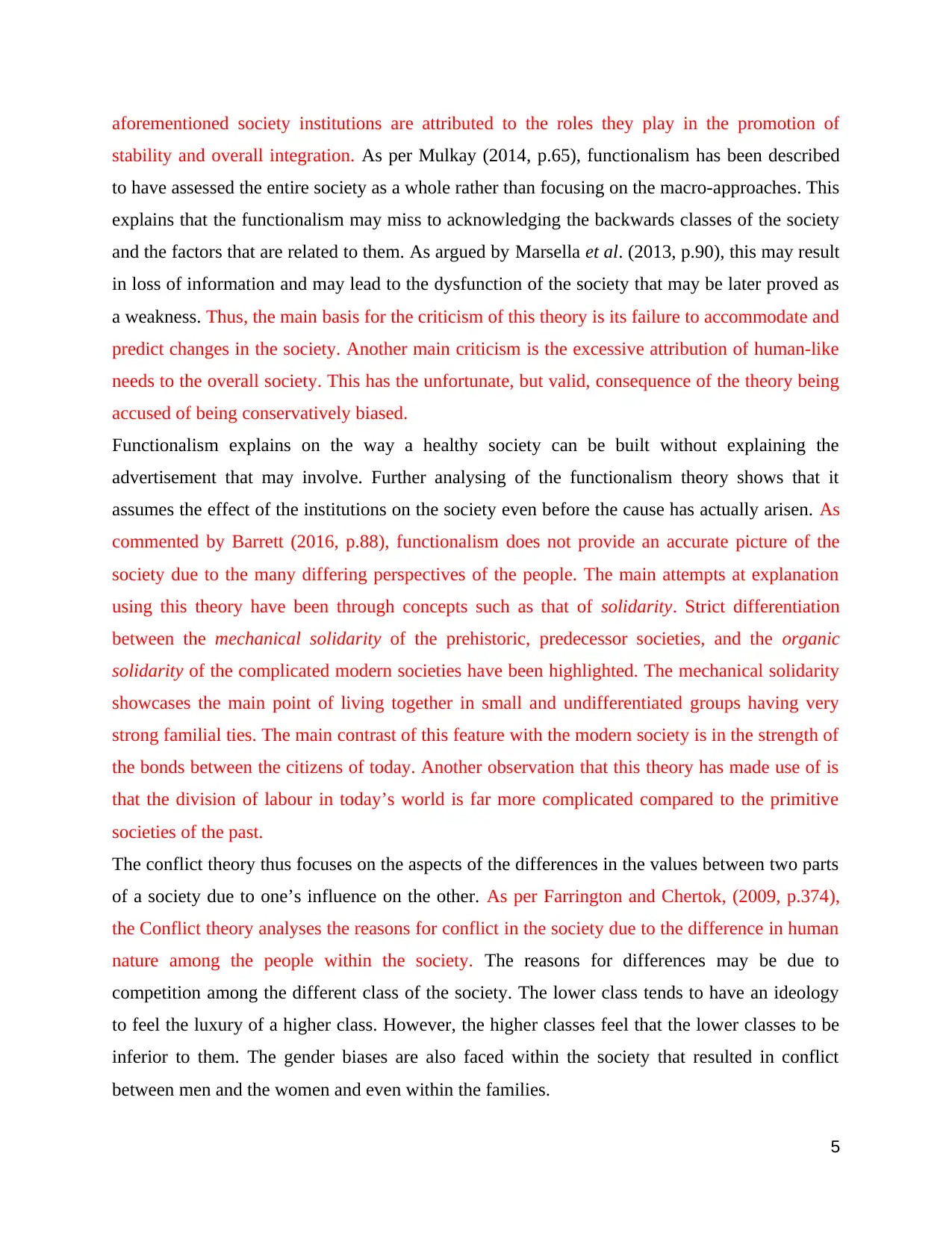
aforementioned society institutions are attributed to the roles they play in the promotion of
stability and overall integration. As per Mulkay (2014, p.65), functionalism has been described
to have assessed the entire society as a whole rather than focusing on the macro-approaches. This
explains that the functionalism may miss to acknowledging the backwards classes of the society
and the factors that are related to them. As argued by Marsella et al. (2013, p.90), this may result
in loss of information and may lead to the dysfunction of the society that may be later proved as
a weakness. Thus, the main basis for the criticism of this theory is its failure to accommodate and
predict changes in the society. Another main criticism is the excessive attribution of human-like
needs to the overall society. This has the unfortunate, but valid, consequence of the theory being
accused of being conservatively biased.
Functionalism explains on the way a healthy society can be built without explaining the
advertisement that may involve. Further analysing of the functionalism theory shows that it
assumes the effect of the institutions on the society even before the cause has actually arisen. As
commented by Barrett (2016, p.88), functionalism does not provide an accurate picture of the
society due to the many differing perspectives of the people. The main attempts at explanation
using this theory have been through concepts such as that of solidarity. Strict differentiation
between the mechanical solidarity of the prehistoric, predecessor societies, and the organic
solidarity of the complicated modern societies have been highlighted. The mechanical solidarity
showcases the main point of living together in small and undifferentiated groups having very
strong familial ties. The main contrast of this feature with the modern society is in the strength of
the bonds between the citizens of today. Another observation that this theory has made use of is
that the division of labour in today’s world is far more complicated compared to the primitive
societies of the past.
The conflict theory thus focuses on the aspects of the differences in the values between two parts
of a society due to one’s influence on the other. As per Farrington and Chertok, (2009, p.374),
the Conflict theory analyses the reasons for conflict in the society due to the difference in human
nature among the people within the society. The reasons for differences may be due to
competition among the different class of the society. The lower class tends to have an ideology
to feel the luxury of a higher class. However, the higher classes feel that the lower classes to be
inferior to them. The gender biases are also faced within the society that resulted in conflict
between men and the women and even within the families.
5
stability and overall integration. As per Mulkay (2014, p.65), functionalism has been described
to have assessed the entire society as a whole rather than focusing on the macro-approaches. This
explains that the functionalism may miss to acknowledging the backwards classes of the society
and the factors that are related to them. As argued by Marsella et al. (2013, p.90), this may result
in loss of information and may lead to the dysfunction of the society that may be later proved as
a weakness. Thus, the main basis for the criticism of this theory is its failure to accommodate and
predict changes in the society. Another main criticism is the excessive attribution of human-like
needs to the overall society. This has the unfortunate, but valid, consequence of the theory being
accused of being conservatively biased.
Functionalism explains on the way a healthy society can be built without explaining the
advertisement that may involve. Further analysing of the functionalism theory shows that it
assumes the effect of the institutions on the society even before the cause has actually arisen. As
commented by Barrett (2016, p.88), functionalism does not provide an accurate picture of the
society due to the many differing perspectives of the people. The main attempts at explanation
using this theory have been through concepts such as that of solidarity. Strict differentiation
between the mechanical solidarity of the prehistoric, predecessor societies, and the organic
solidarity of the complicated modern societies have been highlighted. The mechanical solidarity
showcases the main point of living together in small and undifferentiated groups having very
strong familial ties. The main contrast of this feature with the modern society is in the strength of
the bonds between the citizens of today. Another observation that this theory has made use of is
that the division of labour in today’s world is far more complicated compared to the primitive
societies of the past.
The conflict theory thus focuses on the aspects of the differences in the values between two parts
of a society due to one’s influence on the other. As per Farrington and Chertok, (2009, p.374),
the Conflict theory analyses the reasons for conflict in the society due to the difference in human
nature among the people within the society. The reasons for differences may be due to
competition among the different class of the society. The lower class tends to have an ideology
to feel the luxury of a higher class. However, the higher classes feel that the lower classes to be
inferior to them. The gender biases are also faced within the society that resulted in conflict
between men and the women and even within the families.
5
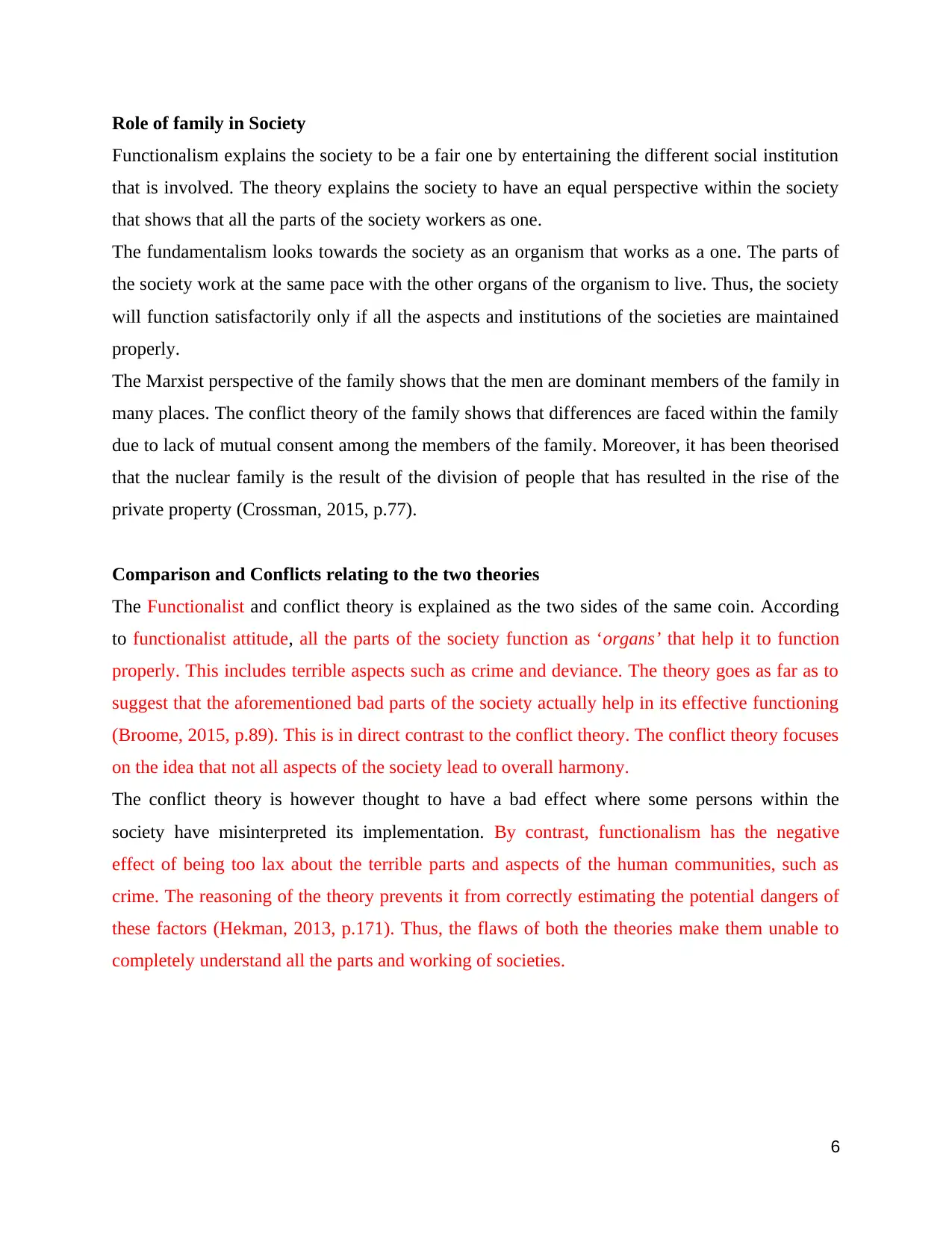
Role of family in Society
Functionalism explains the society to be a fair one by entertaining the different social institution
that is involved. The theory explains the society to have an equal perspective within the society
that shows that all the parts of the society workers as one.
The fundamentalism looks towards the society as an organism that works as a one. The parts of
the society work at the same pace with the other organs of the organism to live. Thus, the society
will function satisfactorily only if all the aspects and institutions of the societies are maintained
properly.
The Marxist perspective of the family shows that the men are dominant members of the family in
many places. The conflict theory of the family shows that differences are faced within the family
due to lack of mutual consent among the members of the family. Moreover, it has been theorised
that the nuclear family is the result of the division of people that has resulted in the rise of the
private property (Crossman, 2015, p.77).
Comparison and Conflicts relating to the two theories
The Functionalist and conflict theory is explained as the two sides of the same coin. According
to functionalist attitude, all the parts of the society function as ‘organs’ that help it to function
properly. This includes terrible aspects such as crime and deviance. The theory goes as far as to
suggest that the aforementioned bad parts of the society actually help in its effective functioning
(Broome, 2015, p.89). This is in direct contrast to the conflict theory. The conflict theory focuses
on the idea that not all aspects of the society lead to overall harmony.
The conflict theory is however thought to have a bad effect where some persons within the
society have misinterpreted its implementation. By contrast, functionalism has the negative
effect of being too lax about the terrible parts and aspects of the human communities, such as
crime. The reasoning of the theory prevents it from correctly estimating the potential dangers of
these factors (Hekman, 2013, p.171). Thus, the flaws of both the theories make them unable to
completely understand all the parts and working of societies.
6
Functionalism explains the society to be a fair one by entertaining the different social institution
that is involved. The theory explains the society to have an equal perspective within the society
that shows that all the parts of the society workers as one.
The fundamentalism looks towards the society as an organism that works as a one. The parts of
the society work at the same pace with the other organs of the organism to live. Thus, the society
will function satisfactorily only if all the aspects and institutions of the societies are maintained
properly.
The Marxist perspective of the family shows that the men are dominant members of the family in
many places. The conflict theory of the family shows that differences are faced within the family
due to lack of mutual consent among the members of the family. Moreover, it has been theorised
that the nuclear family is the result of the division of people that has resulted in the rise of the
private property (Crossman, 2015, p.77).
Comparison and Conflicts relating to the two theories
The Functionalist and conflict theory is explained as the two sides of the same coin. According
to functionalist attitude, all the parts of the society function as ‘organs’ that help it to function
properly. This includes terrible aspects such as crime and deviance. The theory goes as far as to
suggest that the aforementioned bad parts of the society actually help in its effective functioning
(Broome, 2015, p.89). This is in direct contrast to the conflict theory. The conflict theory focuses
on the idea that not all aspects of the society lead to overall harmony.
The conflict theory is however thought to have a bad effect where some persons within the
society have misinterpreted its implementation. By contrast, functionalism has the negative
effect of being too lax about the terrible parts and aspects of the human communities, such as
crime. The reasoning of the theory prevents it from correctly estimating the potential dangers of
these factors (Hekman, 2013, p.171). Thus, the flaws of both the theories make them unable to
completely understand all the parts and working of societies.
6
⊘ This is a preview!⊘
Do you want full access?
Subscribe today to unlock all pages.

Trusted by 1+ million students worldwide
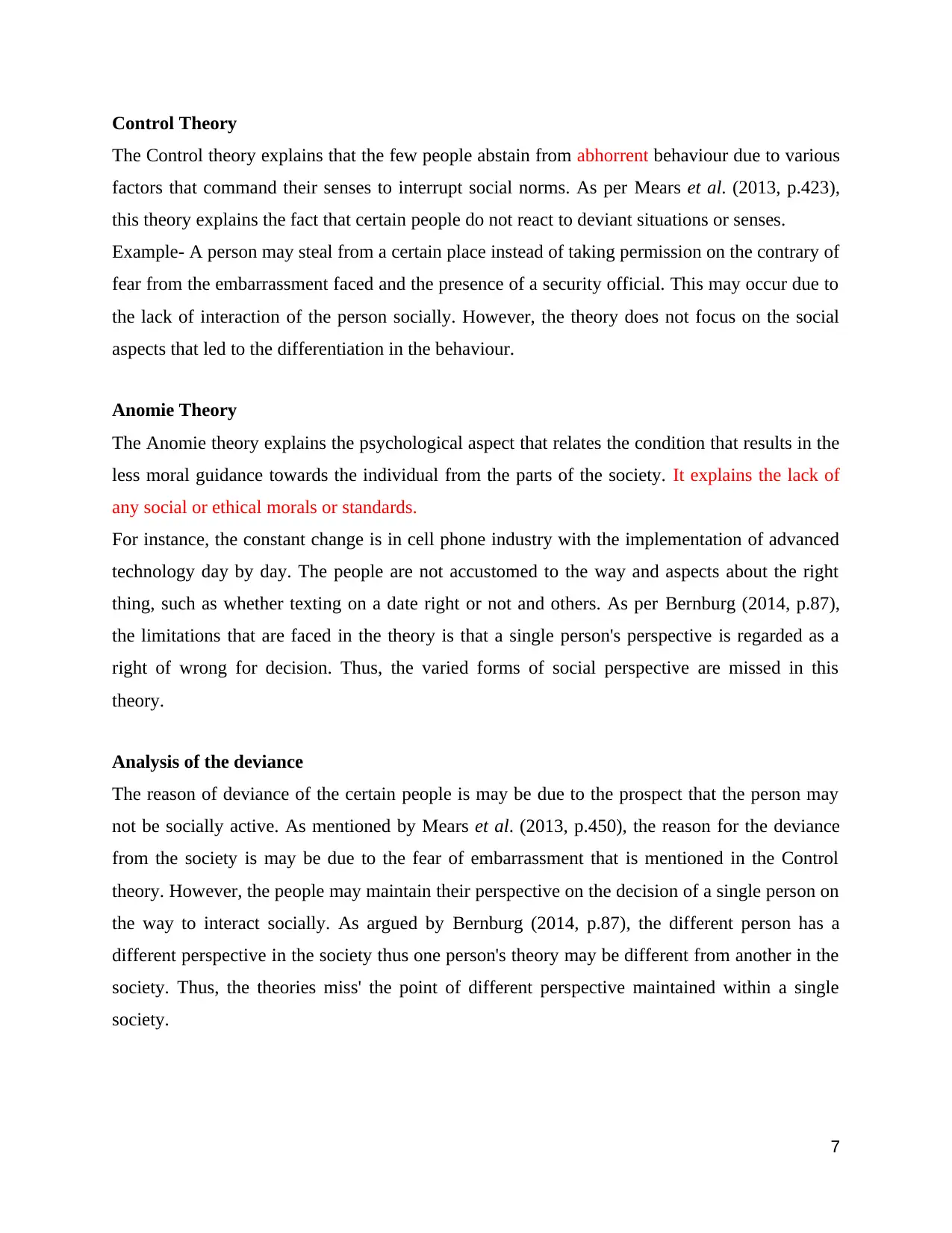
Control Theory
The Control theory explains that the few people abstain from abhorrent behaviour due to various
factors that command their senses to interrupt social norms. As per Mears et al. (2013, p.423),
this theory explains the fact that certain people do not react to deviant situations or senses.
Example- A person may steal from a certain place instead of taking permission on the contrary of
fear from the embarrassment faced and the presence of a security official. This may occur due to
the lack of interaction of the person socially. However, the theory does not focus on the social
aspects that led to the differentiation in the behaviour.
Anomie Theory
The Anomie theory explains the psychological aspect that relates the condition that results in the
less moral guidance towards the individual from the parts of the society. It explains the lack of
any social or ethical morals or standards.
For instance, the constant change is in cell phone industry with the implementation of advanced
technology day by day. The people are not accustomed to the way and aspects about the right
thing, such as whether texting on a date right or not and others. As per Bernburg (2014, p.87),
the limitations that are faced in the theory is that a single person's perspective is regarded as a
right of wrong for decision. Thus, the varied forms of social perspective are missed in this
theory.
Analysis of the deviance
The reason of deviance of the certain people is may be due to the prospect that the person may
not be socially active. As mentioned by Mears et al. (2013, p.450), the reason for the deviance
from the society is may be due to the fear of embarrassment that is mentioned in the Control
theory. However, the people may maintain their perspective on the decision of a single person on
the way to interact socially. As argued by Bernburg (2014, p.87), the different person has a
different perspective in the society thus one person's theory may be different from another in the
society. Thus, the theories miss' the point of different perspective maintained within a single
society.
7
The Control theory explains that the few people abstain from abhorrent behaviour due to various
factors that command their senses to interrupt social norms. As per Mears et al. (2013, p.423),
this theory explains the fact that certain people do not react to deviant situations or senses.
Example- A person may steal from a certain place instead of taking permission on the contrary of
fear from the embarrassment faced and the presence of a security official. This may occur due to
the lack of interaction of the person socially. However, the theory does not focus on the social
aspects that led to the differentiation in the behaviour.
Anomie Theory
The Anomie theory explains the psychological aspect that relates the condition that results in the
less moral guidance towards the individual from the parts of the society. It explains the lack of
any social or ethical morals or standards.
For instance, the constant change is in cell phone industry with the implementation of advanced
technology day by day. The people are not accustomed to the way and aspects about the right
thing, such as whether texting on a date right or not and others. As per Bernburg (2014, p.87),
the limitations that are faced in the theory is that a single person's perspective is regarded as a
right of wrong for decision. Thus, the varied forms of social perspective are missed in this
theory.
Analysis of the deviance
The reason of deviance of the certain people is may be due to the prospect that the person may
not be socially active. As mentioned by Mears et al. (2013, p.450), the reason for the deviance
from the society is may be due to the fear of embarrassment that is mentioned in the Control
theory. However, the people may maintain their perspective on the decision of a single person on
the way to interact socially. As argued by Bernburg (2014, p.87), the different person has a
different perspective in the society thus one person's theory may be different from another in the
society. Thus, the theories miss' the point of different perspective maintained within a single
society.
7
Paraphrase This Document
Need a fresh take? Get an instant paraphrase of this document with our AI Paraphraser
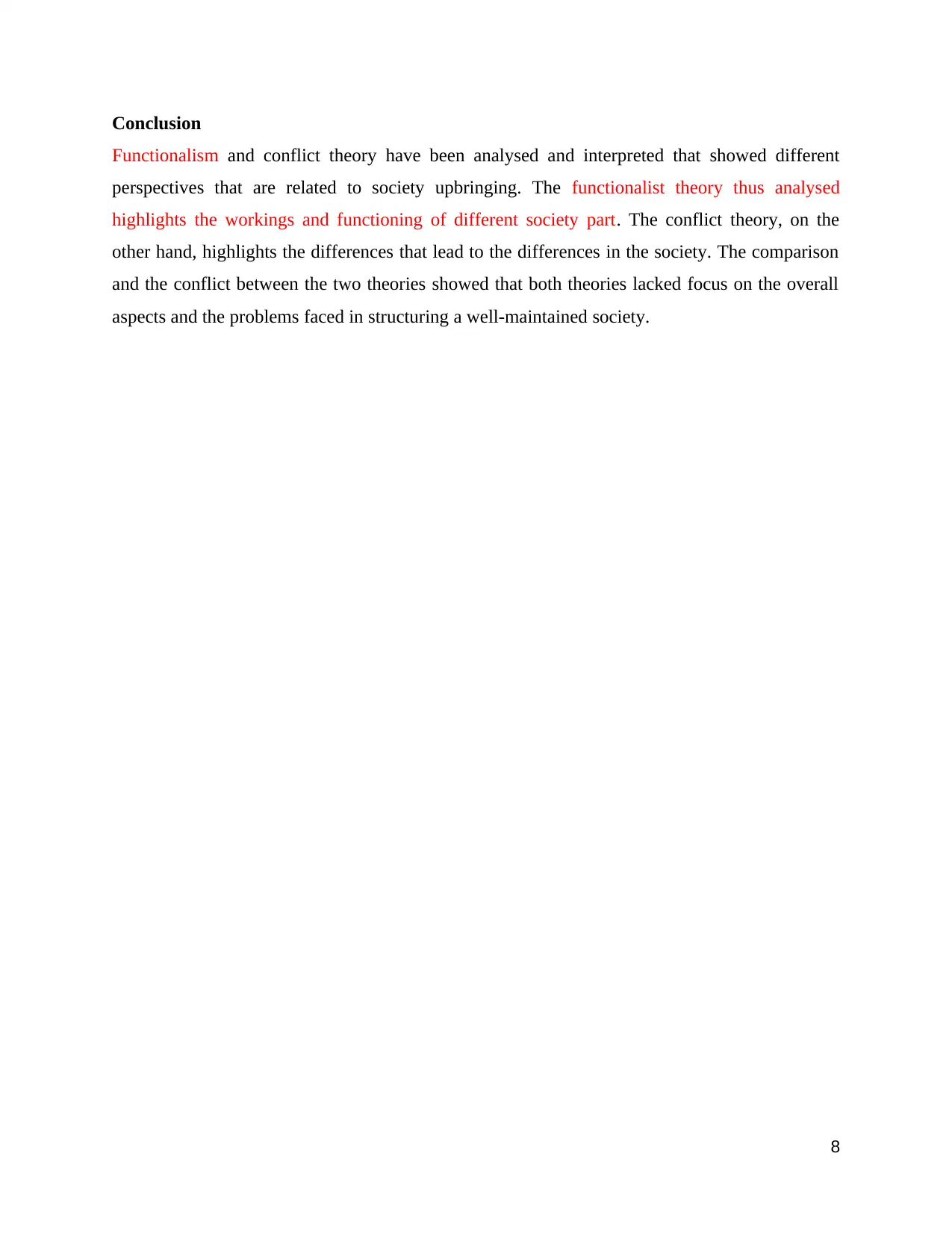
Conclusion
Functionalism and conflict theory have been analysed and interpreted that showed different
perspectives that are related to society upbringing. The functionalist theory thus analysed
highlights the workings and functioning of different society part. The conflict theory, on the
other hand, highlights the differences that lead to the differences in the society. The comparison
and the conflict between the two theories showed that both theories lacked focus on the overall
aspects and the problems faced in structuring a well-maintained society.
8
Functionalism and conflict theory have been analysed and interpreted that showed different
perspectives that are related to society upbringing. The functionalist theory thus analysed
highlights the workings and functioning of different society part. The conflict theory, on the
other hand, highlights the differences that lead to the differences in the society. The comparison
and the conflict between the two theories showed that both theories lacked focus on the overall
aspects and the problems faced in structuring a well-maintained society.
8
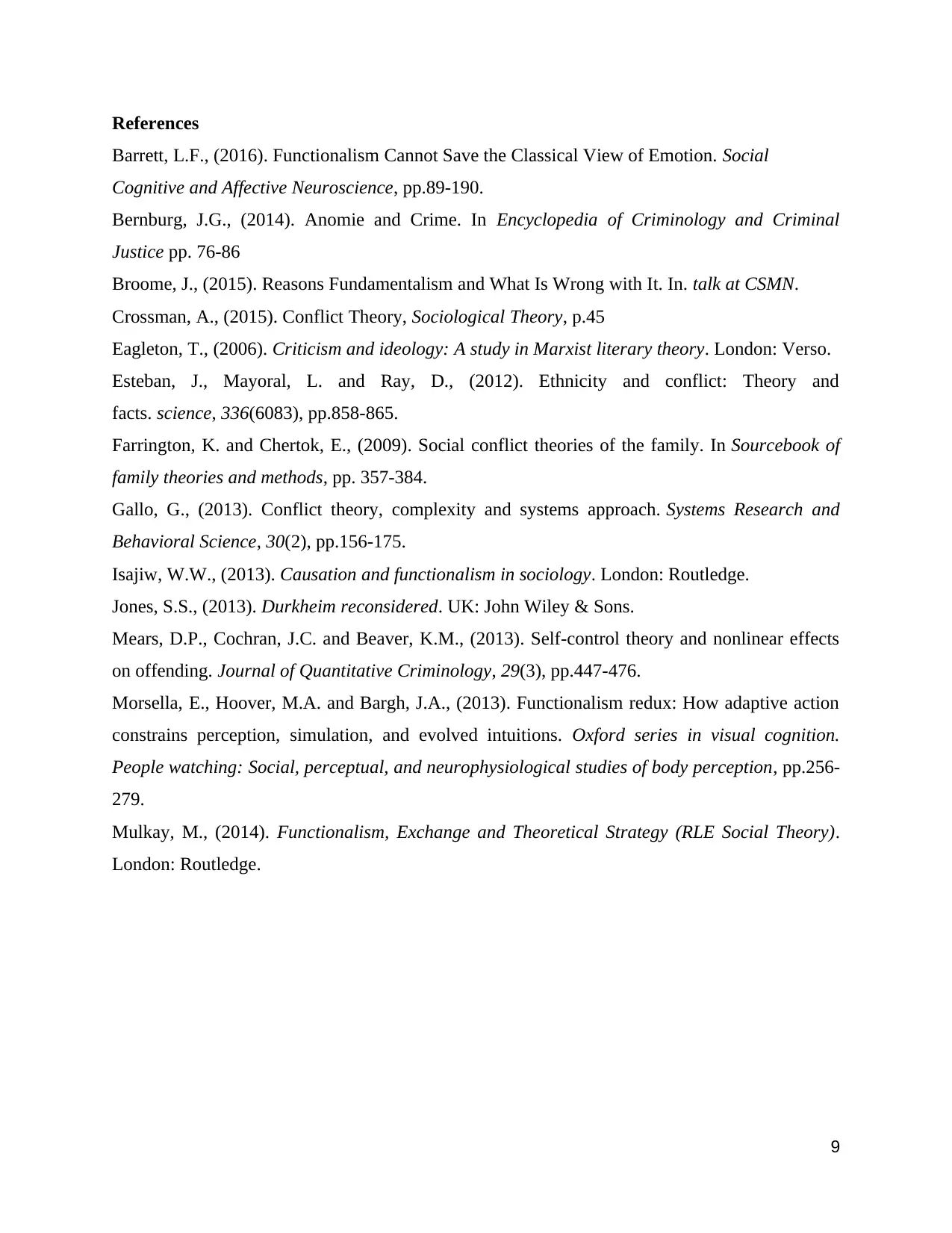
References
Barrett, L.F., (2016). Functionalism Cannot Save the Classical View of Emotion. Social
Cognitive and Affective Neuroscience, pp.89-190.
Bernburg, J.G., (2014). Anomie and Crime. In Encyclopedia of Criminology and Criminal
Justice pp. 76-86
Broome, J., (2015). Reasons Fundamentalism and What Is Wrong with It. In. talk at CSMN.
Crossman, A., (2015). Conflict Theory, Sociological Theory, p.45
Eagleton, T., (2006). Criticism and ideology: A study in Marxist literary theory. London: Verso.
Esteban, J., Mayoral, L. and Ray, D., (2012). Ethnicity and conflict: Theory and
facts. science, 336(6083), pp.858-865.
Farrington, K. and Chertok, E., (2009). Social conflict theories of the family. In Sourcebook of
family theories and methods, pp. 357-384.
Gallo, G., (2013). Conflict theory, complexity and systems approach. Systems Research and
Behavioral Science, 30(2), pp.156-175.
Isajiw, W.W., (2013). Causation and functionalism in sociology. London: Routledge.
Jones, S.S., (2013). Durkheim reconsidered. UK: John Wiley & Sons.
Mears, D.P., Cochran, J.C. and Beaver, K.M., (2013). Self-control theory and nonlinear effects
on offending. Journal of Quantitative Criminology, 29(3), pp.447-476.
Morsella, E., Hoover, M.A. and Bargh, J.A., (2013). Functionalism redux: How adaptive action
constrains perception, simulation, and evolved intuitions. Oxford series in visual cognition.
People watching: Social, perceptual, and neurophysiological studies of body perception, pp.256-
279.
Mulkay, M., (2014). Functionalism, Exchange and Theoretical Strategy (RLE Social Theory).
London: Routledge.
9
Barrett, L.F., (2016). Functionalism Cannot Save the Classical View of Emotion. Social
Cognitive and Affective Neuroscience, pp.89-190.
Bernburg, J.G., (2014). Anomie and Crime. In Encyclopedia of Criminology and Criminal
Justice pp. 76-86
Broome, J., (2015). Reasons Fundamentalism and What Is Wrong with It. In. talk at CSMN.
Crossman, A., (2015). Conflict Theory, Sociological Theory, p.45
Eagleton, T., (2006). Criticism and ideology: A study in Marxist literary theory. London: Verso.
Esteban, J., Mayoral, L. and Ray, D., (2012). Ethnicity and conflict: Theory and
facts. science, 336(6083), pp.858-865.
Farrington, K. and Chertok, E., (2009). Social conflict theories of the family. In Sourcebook of
family theories and methods, pp. 357-384.
Gallo, G., (2013). Conflict theory, complexity and systems approach. Systems Research and
Behavioral Science, 30(2), pp.156-175.
Isajiw, W.W., (2013). Causation and functionalism in sociology. London: Routledge.
Jones, S.S., (2013). Durkheim reconsidered. UK: John Wiley & Sons.
Mears, D.P., Cochran, J.C. and Beaver, K.M., (2013). Self-control theory and nonlinear effects
on offending. Journal of Quantitative Criminology, 29(3), pp.447-476.
Morsella, E., Hoover, M.A. and Bargh, J.A., (2013). Functionalism redux: How adaptive action
constrains perception, simulation, and evolved intuitions. Oxford series in visual cognition.
People watching: Social, perceptual, and neurophysiological studies of body perception, pp.256-
279.
Mulkay, M., (2014). Functionalism, Exchange and Theoretical Strategy (RLE Social Theory).
London: Routledge.
9
⊘ This is a preview!⊘
Do you want full access?
Subscribe today to unlock all pages.

Trusted by 1+ million students worldwide
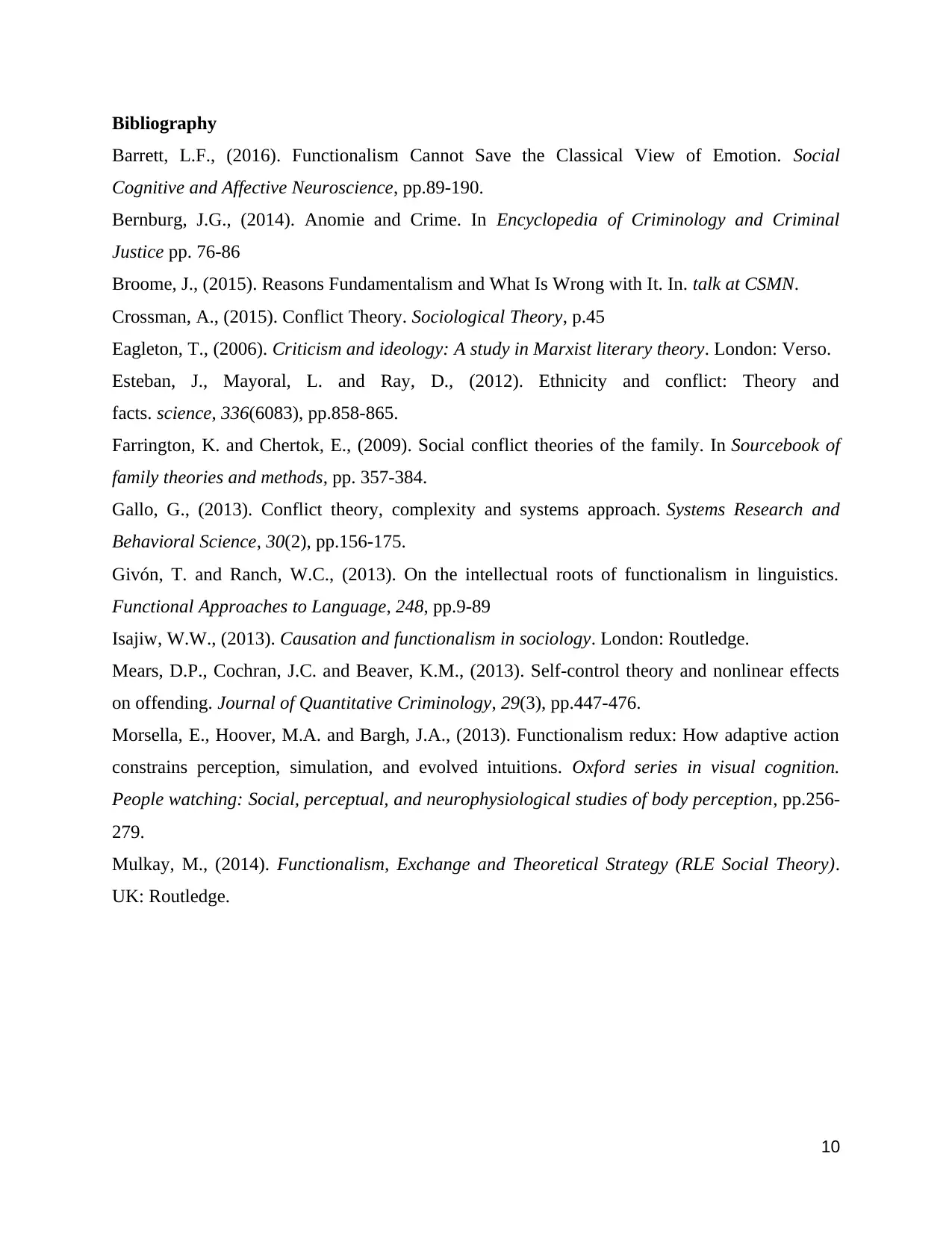
Bibliography
Barrett, L.F., (2016). Functionalism Cannot Save the Classical View of Emotion. Social
Cognitive and Affective Neuroscience, pp.89-190.
Bernburg, J.G., (2014). Anomie and Crime. In Encyclopedia of Criminology and Criminal
Justice pp. 76-86
Broome, J., (2015). Reasons Fundamentalism and What Is Wrong with It. In. talk at CSMN.
Crossman, A., (2015). Conflict Theory. Sociological Theory, p.45
Eagleton, T., (2006). Criticism and ideology: A study in Marxist literary theory. London: Verso.
Esteban, J., Mayoral, L. and Ray, D., (2012). Ethnicity and conflict: Theory and
facts. science, 336(6083), pp.858-865.
Farrington, K. and Chertok, E., (2009). Social conflict theories of the family. In Sourcebook of
family theories and methods, pp. 357-384.
Gallo, G., (2013). Conflict theory, complexity and systems approach. Systems Research and
Behavioral Science, 30(2), pp.156-175.
Givón, T. and Ranch, W.C., (2013). On the intellectual roots of functionalism in linguistics.
Functional Approaches to Language, 248, pp.9-89
Isajiw, W.W., (2013). Causation and functionalism in sociology. London: Routledge.
Mears, D.P., Cochran, J.C. and Beaver, K.M., (2013). Self-control theory and nonlinear effects
on offending. Journal of Quantitative Criminology, 29(3), pp.447-476.
Morsella, E., Hoover, M.A. and Bargh, J.A., (2013). Functionalism redux: How adaptive action
constrains perception, simulation, and evolved intuitions. Oxford series in visual cognition.
People watching: Social, perceptual, and neurophysiological studies of body perception, pp.256-
279.
Mulkay, M., (2014). Functionalism, Exchange and Theoretical Strategy (RLE Social Theory).
UK: Routledge.
10
Barrett, L.F., (2016). Functionalism Cannot Save the Classical View of Emotion. Social
Cognitive and Affective Neuroscience, pp.89-190.
Bernburg, J.G., (2014). Anomie and Crime. In Encyclopedia of Criminology and Criminal
Justice pp. 76-86
Broome, J., (2015). Reasons Fundamentalism and What Is Wrong with It. In. talk at CSMN.
Crossman, A., (2015). Conflict Theory. Sociological Theory, p.45
Eagleton, T., (2006). Criticism and ideology: A study in Marxist literary theory. London: Verso.
Esteban, J., Mayoral, L. and Ray, D., (2012). Ethnicity and conflict: Theory and
facts. science, 336(6083), pp.858-865.
Farrington, K. and Chertok, E., (2009). Social conflict theories of the family. In Sourcebook of
family theories and methods, pp. 357-384.
Gallo, G., (2013). Conflict theory, complexity and systems approach. Systems Research and
Behavioral Science, 30(2), pp.156-175.
Givón, T. and Ranch, W.C., (2013). On the intellectual roots of functionalism in linguistics.
Functional Approaches to Language, 248, pp.9-89
Isajiw, W.W., (2013). Causation and functionalism in sociology. London: Routledge.
Mears, D.P., Cochran, J.C. and Beaver, K.M., (2013). Self-control theory and nonlinear effects
on offending. Journal of Quantitative Criminology, 29(3), pp.447-476.
Morsella, E., Hoover, M.A. and Bargh, J.A., (2013). Functionalism redux: How adaptive action
constrains perception, simulation, and evolved intuitions. Oxford series in visual cognition.
People watching: Social, perceptual, and neurophysiological studies of body perception, pp.256-
279.
Mulkay, M., (2014). Functionalism, Exchange and Theoretical Strategy (RLE Social Theory).
UK: Routledge.
10
1 out of 10
Related Documents
Your All-in-One AI-Powered Toolkit for Academic Success.
+13062052269
info@desklib.com
Available 24*7 on WhatsApp / Email
![[object Object]](/_next/static/media/star-bottom.7253800d.svg)
Unlock your academic potential
Copyright © 2020–2026 A2Z Services. All Rights Reserved. Developed and managed by ZUCOL.





